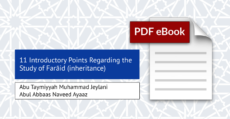In the name of Allāh, ar-Raḥmān (the most merciful), ar-Raḥīm (the bestower of mercy).
This article outlines various rulings related to suicide, including: Is suicide Kufr? What is the final abode of this person? Is janāzah ṣalāh prayed over a person who commits suicide? How should a community react to a suicide?
What is the ruling on suicide?
Committing suicide is a major sin like adultery, stealing and drinking alcohol. Regarding suicide, the Prophet ﷺ said:
Whoever kills himself with something in this world will be punished with it on the Day of Resurrection. [1]
The Prophet ﷺ clarified this general rule by saying:
Whoever throws himself from a mountain and kills himself will be in the Fire, throwing himself down therein forever. Whoever takes poison and kills himself, his poison will be in his hand and he will be sipping it in the Fire of Hell forever. Whoever kills himself with a piece of iron, that piece of iron will be in his hand and he will be stabbing himself in the stomach with it in the Fire of Hell, forever. [2]
The above aḥādīth prove that committing suicide is a severe action for which there is a severe punishment set out by Allāh.
What is the difference between an action being a major sin and major kufr (disbelief)?
The difference between them both is that major kufr is disbelief, it invalidates a person’s Islām such that the person is no longer a Muslim. If he dies upon major kufr without repenting, he dies as a kāfir (non-Muslim) and will not enter Paradise.
On the other hand, a major sin is a severe action for which there is a severe punishment, but the person remains a Muslim. Even if such a person did not repent from his sins, perhaps Allāh will forgive him out of his mercy. As long as he dies upon tawḥīd, he will enter Paradise.
Is suicide a major sin or major kufr?
The aforementioned aḥādīth prove that suicide is ḥarām, however the scholars have agreed it is a major sin and not kufr. This is because suicide does not contain anything which contradicts imān and tawḥīd.
Shaykh Ibn Bāz, raḥimahullah, said:
“Any Muslim who kills himself mistakenly is excused and does not sin. However, any Muslim who kills himself intentionally (i.e. suicide) due to his personal situation – as long as he is not resentful of the decree of Allāh – is not a kāfir. Rather he has committed a major sin for which there is the threat of the Fire. Ultimately his affair is with Allāh – if Allāh wills he shall pardon and forgive him, and if he wills he will punish him.” [3]
Why does the ḥadīth say he is in the Fire?
There are many aḥādīth which mention the punishment of the Fire for those who commit major sins such as murder, dealing with interest (usury), adultery, alcoholism, gambling etc… This is similar to the above-mentioned narrations regarding suicide. Although these aḥādīth mention the Fire, they do not necessitate that these sinners will remain in the Fire for eternity. As a general principle, every Muslim who dies upon tawḥīd will eventually enter Paradise, but before that whether he is punished or not is with Allāh.
Importantly, aḥādīth which contain general rulings for groups of people being in the Fire or Paradise cannot be specified to individual Muslims. They remain upon their generality.
Can we say this person who committed suicide is in the Fire?
Despite suicide being a major sin for which there is a threat of the Fire, this does not necessitate that this person has left the fold of Islām and dies upon kufr.
The belief of Ahlus-Sunnah is that we never declare any particular Muslim to be a non-Muslim on account of major sins. This was the belief of the Khawārij, that whoever commits a major sin, has left the fold of Islām and therefore enters the Fire eternally.
We affirm the punishment generally, but we can never say with certainty that so-and-so Muslim will enter the Fire. His ruling is according to whatever Allāh wills, he may pardon such a person or he may punish him, and Allāh never wrongs a person. The only condition is that the person died as a Muslim upon tawḥīd.
Should the janāzah be prayed over a person who commits suicide?
As we have established above, a person who commits suicide dies as a Muslim, and janāzah ṣalāh is performed for every Muslim. However, to show the seriousness of this sin it is better for the people of knowledge and status to not offer the janāzah ṣalāh whilst at the same time encouraging the rest of the Muslims to do so.
This is taken from the action of the Prophet ﷺ himself. Jābir Ibn Samurah, radiaAllāhu ‘anhu said:
The Prophet ﷺ passed by a man who had killed himself with an arrow, and he did not pray [janāzah] upon him. [4]
al-Ḥafiẓ an-Nawawi commented on this ḥadīth saying,
“This ḥadīth is implied to dissuade people from suicide, similar to the Prophet ﷺ not praying janāzah upon a person who died with debt, even though he ordered the rest of the Companions to do so. He only did this to scare people away from being in debt, not because the person was a kāfir (non-Muslim)…” [5]
So we should pray janāzah over every Muslim even if he committed suicide, but the people of knowledge and status in that area should not do so, only to show the rest of the Muslims how repulsive a sin this is.
How should we react when a Muslim commits suicide?
There are several guidelines we should bear in mind when we hear of a Muslim committing suicide:
1. Before anything, we should always verify everything which we see on social media. Often false rumours are spread or events are taken out of context. Allāh, the exalted and majestic, said:
{O you who believe, if an evil person comes to you with any news, verify it, lest you should harm people in ignorance, and afterwards you become regretful for what you have done} [49:06]
2. We should react with sympathy and pity towards the one who committed suicide; he only did such an action out of desperation that perhaps we cannot understand. Consider that he may have had a mental condition we are unaware of, or was affected by paranoia, jinn or black magic.
3. We should offer comfort and advice to family members. Whilst believing the action to be ḥarām, we should not condemn the person to the Fire. Rather we should give the family members hope in the mercy and forgiveness of Allāh.
4. We should seek forgiveness for the person who committed suicide, make du’ā for him and pray his janāzah.
5. Ultimately, we should take a lesson from his desperation in increasing our own imān, understanding the decree of Allāh, appreciating the wisdom of Allāh in everything and seeking knowledge about ‘aqīdah.
6. As a community – and especially as a masjid – we must take lessons from such unfortunate events. It’s important to recognize the growing prevalence of mental health struggles, particularly among our youth. We should remain attentive to the signs of emotional distress in others, and where possible, guide them toward trustworthy and responsible support.
O Allāh, forgive us, our parents, teachers and the Muslims. May salutations of praise and peace be upon our beloved Prophet, his family, companions and all those who follow his way until the Day of Resurrection.
Written by,
Abul Abbaas Naveed Ayaaz
Birmingham, UK.
26 Ramadan 1439h, corresponding to Sunday 10 June 2018.
Footnotes
[1] Narrated by Thābit Ibn Daḥāk; Collected by al-Bukhārī & Muslim.
[2] Narrated by Abu Hurayrah; Collected by al-Bukhārī & Muslim.
Note: The Arabic word used in the Hadeeth is خالدين which literally means ‘forever,’ but it can also mean ‘a very long time’.
The Salaf would pass by such āyāt and aḥādīth without delving into them for fear of lessening the severity of the word.
[3] Fatāwa al-Lajnah ad-Dāimah #5958
[4] Narrated by Jābir Ibn Samurah; Collected by Muslim
[5] Sharḥ Ṣaḥiḥ Muslim Vol. 7 Page. 47.





